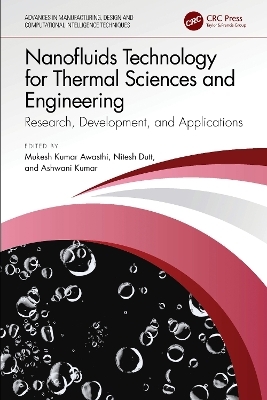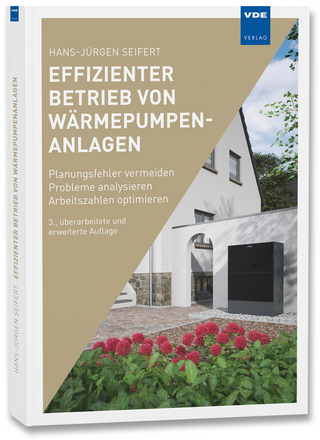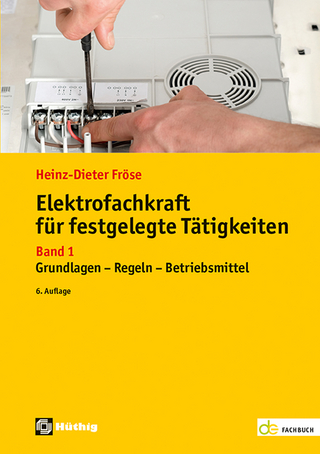
Nanofluids Technology for Thermal Sciences and Engineering
CRC Press (Verlag)
978-1-032-79911-7 (ISBN)
This text highlights how nanofluids can be used in thermal solutions across multiple industries, including electronics, energy, and manufacturing. It emphasizes the enhanced heat transfer properties of nanofluids and their potential to significantly improve the efficiency of heat exchange processes. This book discusses topics such as nanoparticle synthesis, nanofluid testing, performance enhancement using nanofluids, thermal behavior of hybrid nanofluids, Brinkman equation in nanofluids and safety considerations in nano fluid‑based systems.
This book:
Discusses the recent innovation, technological development of nanofluids and explores nanoparticle synthesis and characterization for nanofluid development
Offers a comprehensive understanding of nanofluid technology and nanofluid for aerospace application, covering diverse topics from fundamental properties to advanced research frontiers in nanofluids for thermal engineering
Includes real‑world case studies and practical techniques that will help the readers to apply nanofluid technology in various thermal engineering scenarios
Covers heat exchanger performance improvement with nanofluids, hybrid nanofluids, Flow of Newtonian and Non‑Newtonian hybrid Nanofluid, and oil‑based Tri‑hybrid Nanofluid
Explains experimental techniques for nanofluid testing and validation and presents safety and environmental considerations in nanofluid‑based systems
It is primarily written for senior undergraduates, graduate students, and academic researchers in the fields of manufacturing engineering, industrial engineering, production engineering, mechanical engineering, automotive engineering, and aerospace engineering.
Mukesh Kumar Awasthi did his PhD on the topic “Viscous Correction for the Potential Flow Analysis of Capillary and Kelvin‑Helmholtz instability”. He is an assistant professor in the Department of Mathematics at Babasaheb Bhimrao Ambedkar University, Lucknow. Dr. Awasthi specialized in the mathematical modeling of flow problems. He has taught courses on Fluid Mechanics, Discrete Mathematics, Partial differential equations, Abstract Algebra, Mathematical Methods, and Measure theory to postgraduate students. He has excellent knowledge in the mathematical modeling of flow problems, and he can solve these problems analytically as well as numerically. He has a good grasp of subjects like viscous potential flow, electro‑hydrodynamics, magneto‑hydrodynamics, heat, and mass transfer. Dr. Awasthi qualified for the National Eligibility Test (NET) conducted on all India level in 2008 by the Council of Scientific and Industrial Research (CSIR) and got a Junior Research Fellowship (JRF) and Senior Research Fellowship (SRF) for doing research. He has published 115 plus research publications (journal articles/books/book chapters/conference articles) in many national and international journals and conferences. Also, he has published eight books. He has attended many symposia, workshops, and conferences in mathematics as well as fluid mechanics. He got “Research Awards” four times consecutively from 2013 to 2016 from the University of Petroleum and Energy Studies, Dehradun, India. He has also received start‑up research funds for his project “Nonlinear study of the interface in multilayer fluid system” from UGC, New Delhi. He is also listed in the top 2% of influential researchers in the world prepared by Stanford University based on Scopus data in 2022. Dr. Nitesh Dutt is an associate professor in the Department of Mechanical Engineering, COER University Roorkee, Uttarakhand, India. He has more than 7 years of teaching experience. He did his bachelor’s degree in mechanical engineering, and has a Masters and PhD from IIT Roorkee. He has published more than 11 research articles in international journals and conferences. His main areas of research include nuclear engineering, heat and mass transfer, thermodynamics, fluid mechanics, refrigeration and air conditioning, computational fluid dynamics (CFD). Dr. Ashwani Kumar holds a PhD in Mechanical Engineering with a specialization in Mechanical Vibration and Design. Currently, he is serving as a senior lecturer in Mechanical Engineering (Gazetted Officer Group B) at the Technical Education Department Uttar Pradesh Kanpur, India (under the Government of Uttar Pradesh). He has been serving the department since December 2013. Previously, Dr. Kumar worked as an assistant professor in the Department of Mechanical Engineering at Graphic Era University, Dehradun, India (NIRF Ranking 55) from July 2010 to November 2013. With over 13 years of experience in research, academia, and administration, he has taken on various roles, including Coordinator for AICTE‑Extension of Approval, Nodal officer for PMKVY‑TI Scheme (Government of India), internal coordinator‑CDTP scheme (Government of Uttar Pradesh), Industry Academia relation officer, Assistant Centre Superintendent (ACS)‑Institute Examination Cell, and Zonal Officer to conduct Joint Entrance Examination (JEE‑Diploma). He also served as a Sector Magistrate for Lok Sabha‑Vidhan Sabha Election. As an academician and researcher, Dr. Kumar holds the position of Series Editor for five book series published by CRC Press (Taylor & Francis USA) and Wiley Scrivener Publishing USA. The book series include Advances in Manufacturing, Design and Computational Intelligence Techniques, Renewable and Sustainable Energy Developments, Smart Innovations and Technological Advancements in Mechanical and Materials Engineering, Solar Thermal Energy Systems: Advancements in Engineering, Ergonomics, Sustainable Development, and Computational Intelligence and Biomedical Engineering. Additionally, he serves as the guest editor of a special issue titled “Sustainable Buildings, Resilient Cities, and Infrastructure Systems” for Buildings (ISSN: 2075‑5309, I.F. 3.8). Dr. Kumar is also the Editor‑in‑Chief for the International Journal of Materials, Manufacturing, and Sustainable Technologies (IJMMST, ISSN: 2583‑6625) and the Editor of the International Journal of Energy Resources Applications (IJERA, ISSN: 2583‑6617). His contributions extend to being a guest editor and editorial board member for eight international journals, as well as a review board member for 20 prestigious international journals indexed in SCI/ SCIE/Scopus, including Applied Acoustics, Measurement, JESTEC, AJSE, SV‑JME, and LAJSS. He has authored and co‑authored over 100 research articles in journals, book chapters, and conferences and has published three patents. Recognized for his excellence in academic and research endeavors, he has received the Best Teacher award. He has successfully supervised 15 B. Tech., M.Tech, and PhD theses and serves as an external doctoral committee member at SRM University, New Delhi. His current research interests encompass AI & ML in mechanical engineering, smart materials & manufacturing techniques, thermal energy storage, building efficiency, renewable energy harvesting, sustainable transportation, and heavy vehicle dynamics.
1. Recent Innovation, Technological Development, and Futuristic Application of Nanofluids. 2. Nanoparticle synthesis and Characterization for Nanofluid development. 3. Experimental Techniques for Nanofluid Testing and Validation. 4. Renewable Thermal Storage Systems And Nano Fluids: Sustainable Energy Solutions. 5. Research Frontiers in Nano-fluids for Thermal Engineering. 6. Safety and Environmental Considerations in Nano Fluid-Based Systems. 7. Heat Exchanger Design and Performance Improvement with Nano fluids. 8. Nanofluids in Automotive Engineering: Cooling and Energy Efficiency Enhancement. 9. Flow of Reiner-Rivlin Nanofluid between two Rotating Disks. 10. Flow and Thermal behavior of Ellis Hybrid Nanofluid. 11. Flow of Newtonian and Non-Newtonian hybrid Nanofluid in cylindrical geometry. 12. Magnetohydrodynamic Flow of Ternary Hybrid Nanofluids Over a Wedge: Influence of Nanoparticle Shape Factor in Solar Energy Applications. 13. Flow and Thermal Characteristics of Diathermic oil based Tri-hybrid Nanofluid. 14. Brinkman Equation in Nanofluids: Generalized Stream Function Solutions. 15. Future Trends and Emerging Research in Nano fluids for Aerospace applications. 16. Evolution of Green Concrete in Building Industry: A Sustainable Approach for Nanomaterials Development & Application.
| Erscheinungsdatum | 26.07.2024 |
|---|---|
| Reihe/Serie | Advances in Manufacturing, Design and Computational Intelligence Techniques |
| Zusatzinfo | 38 Tables, black and white; 60 Line drawings, black and white; 35 Halftones, black and white; 95 Illustrations, black and white |
| Verlagsort | London |
| Sprache | englisch |
| Maße | 156 x 234 mm |
| Gewicht | 807 g |
| Themenwelt | Technik ► Elektrotechnik / Energietechnik |
| Technik ► Maschinenbau | |
| Technik ► Umwelttechnik / Biotechnologie | |
| ISBN-10 | 1-032-79911-0 / 1032799110 |
| ISBN-13 | 978-1-032-79911-7 / 9781032799117 |
| Zustand | Neuware |
| Informationen gemäß Produktsicherheitsverordnung (GPSR) | |
| Haben Sie eine Frage zum Produkt? |
aus dem Bereich


